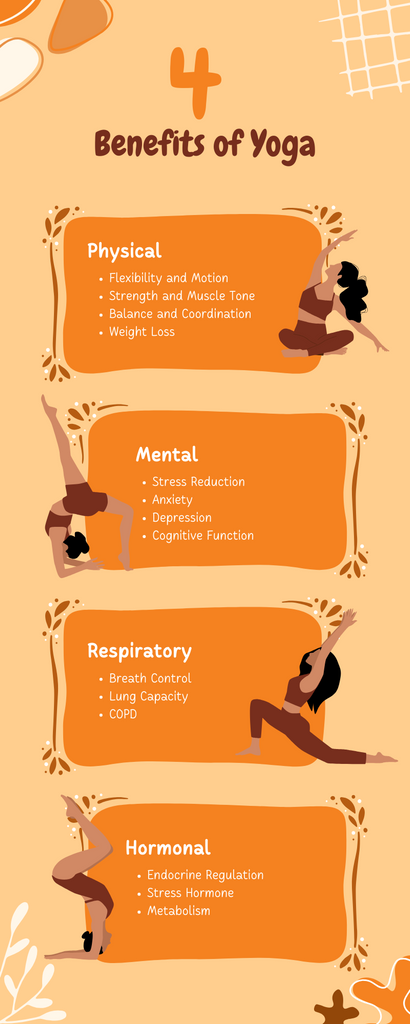The 4 Main Benefits of Yoga
| March 19, 2024
In today's busy world, it is getting harder to strike a balance between physical fitness and mental health. Yoga, a practice that originated in India centuries ago, has gained immense popularity in recent times as a holistic way to achieve harmony between the body, mind, and soul.
1) Physical Benefits of Yoga
Flexibility and Range of Motion
Practicing yoga offers numerous physical benefits, with one of the most prominent being improved flexibility. Yoga uses a series of poses and stretches to help lengthen and release tension in muscles, which in turn increases the range of motion in joints.
Strength and Muscle Tone
It is important to note that yoga is also an effective way to build strength. This is because many yoga poses require you to hold and support your body weight in different positions, which engages and tones various muscle groups.
Balance and Coordination
The emphasis on body awareness and mindfulness in yoga contributes to improved balance and coordination. The practice of holding poses and transitioning between them challenges the neuromuscular system, leading to better overall stability.
Induces Weight Loss
While not traditionally classified as an aerobic exercise, various types of yoga, including less intense forms like restorative yoga, have demonstrated effectiveness in aiding weight loss. Recent evidence suggests that even individuals struggling with obesity can benefit from incorporating yoga into their fitness routine1.
2) Mental Health Benefits of Yoga
Stress Reduction and Relaxation
Yoga is known for its stress-reducing and relaxation-inducing benefits. The combination of breathing techniques, meditation, and gentle movements promotes calmness and activates the body's relaxation response2.
A significant study revealed a decrease in cortisol levels, the primary stress hormone, in individuals engaging in yoga. A chronic elevation of cortisol can damage organs. Moreover, yoga induces the release of endorphins, promoting further relaxation and stress reduction3.
Anxiety and Depression Management
Research suggests that yoga can be a valuable complementary therapy for individuals dealing with anxiety and depression. The mindful nature of the practice encourages present-moment awareness, helping individuals break free from negative thought patterns. The practice balances the sympathetic nervous system and upregulates the production of GABA, a neurotransmitter promoting relaxation4.
How Yoga Helps with Depression
Yoga also stimulates the release of neurotransmitters like serotonin, contributing to an improved mood. Studies reveal that individuals grappling with depression often exhibit lower serotonin levels. Yoga's role in enhancing serotonin concentration aligns with the effects of Selective Serotonin Reuptake Inhibitors (SSRIs), the gold standard treatment for depression. Recent studies underscore the modulation of stress, increased energy levels, improved symptoms of anxiety and depression, and the induction of self-soothing and relaxation as notable mental health benefits of yoga5.
Enhanced Cognitive Function
The meditative aspects of yoga have been linked to enhanced cognitive function. Practices such as mindfulness meditation, commonly integrated into yoga sessions, have been shown to improve attention, memory, and overall cognitive performance6.
3) Improved Respiratory Health
Breath Control and Lung Capacity
Yoga places significant emphasis on controlling the breath, also known as pranayama. Through specific breathing techniques, practitioners learn to deepen and control their breath, increasing lung capacity and improving respiratory function.
Respiratory Conditions Management
For people with respiratory illnesses such as asthma or chronic obstructive pulmonary disease (COPD), yoga can be a therapeutic tool. Certain breathing exercises and gentle yoga postures can help manage symptoms, improve lung function, and enhance overall respiratory well-being7,8.
4) Improved Hormonal Balance
Endocrine System Regulation
Yoga can have a positive impact on the endocrine system, which is responsible for regulating hormones. Certain yoga poses stimulate specific glands, such as the thyroid and adrenal glands, promoting hormonal balance. Particularly beneficial are those who suffer from hormonal imbalances or conditions like polycystic ovary syndrome (PCOS).
Stress Hormone Reduction
Experiencing prolonged stress can result in the excessive production of stress hormones, such as cortisol. Yoga's ability to reduce stress and promote relaxation contributes to a decrease in the levels of these harmful hormones9. This, in turn, has a positive effect on the immune system and metabolism.
Boosts Metabolism
Yoga emerges as a potent stimulator of the basal metabolic rate (BMR), influencing factors such as age, gender, body type, physical activity, and diet. A 2019 meta-analysis revealed that yoga optimizes BMR by impacting hormones such as insulin, cortisol, and norepinephrine. Understanding the factors that influence BMR underscores yoga's role in promoting overall metabolic health10.
The Bottom Line
The benefits of yoga are vast and extend beyond the physical postures that are often associated with the practice. From improved flexibility and strength to enhanced mental well-being and hormonal balance, yoga offers a holistic approach to health and wellness.
- Choosing a selection results in a full page refresh.
- Press the space key then arrow keys to make a selection.

